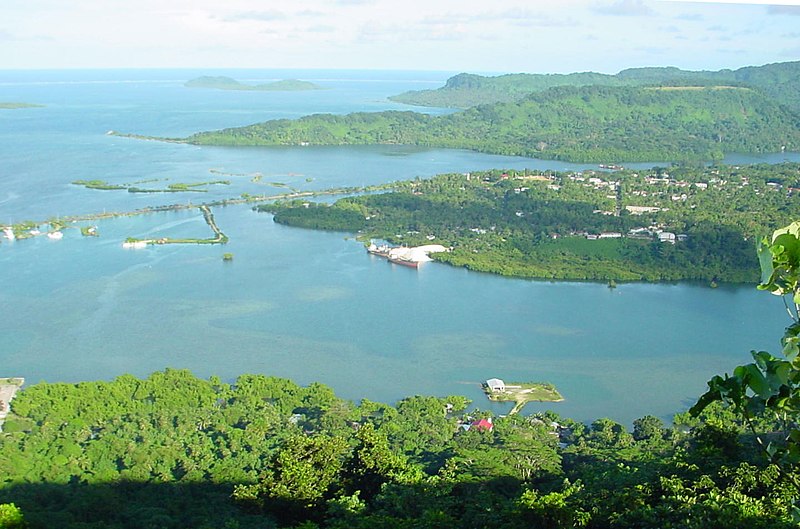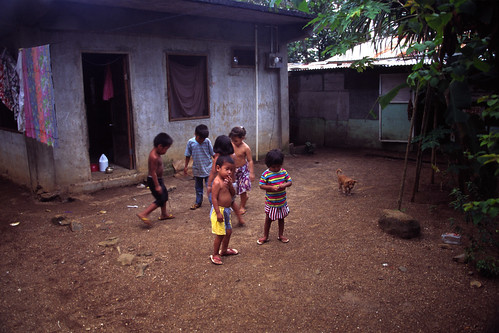Adopting from Micronesia, Federated States of
Contents
Hague Convention Information
The Federated States of Micronesia, is not party to the Hague Convention on Protection of Children and Co-operation in Respect of Intercountry Adoption (the Hague Adoption Convention). Intercountry adoptions of children from non-Hague countries are processed in accordance with 8 Code of Federal Regulations, Section 204.3 as it relates to orphans as defined under the Immigration and Nationality Act, Section 101(b)(1)(F).
PLEASE NOTE: Under the Compact of Free Association between the United States and the Federated States of Micronesia (FSM), FSM citizens have the right to live, work, study and assume residence in the United States with no visa requirement. However, this does not apply to adopted children from the FSM, who must obtain a U.S. immigrant visa in order to travel to reside permanently with their adoptive families in the United States.
IMPORTANT CHANGE FROM PAST VISA PRACTICE WITH REGARD TO ADOPTED CHILDREN of the FSM: In the past, some children adopted by U.S. citizens were permitted to travel to the United States to reside there permanently without obtaining U.S. immigrant visas. This is no longer possible. Adopted children from the FSM must obtain immigrant visas if they intend to take up residence in the United States.
This in no way impacts the right of FSM citizens to continue "legitimate residence" in the United States. Nor does it affect the right of FSM parents to take their own children to the United States for this purpose. This issue concerns only those children of the FSM traveling to the United States with their U.S. citizen adoptive or prospective adoptive parents.
Enforcement of the requirement that adopted children from the FSM obtain U.S. immigrant visas is in the children's best interests. U.S. citizen prospective adoptive parents will now have to petition USCIS for permission to adopt a child from abroad, and as part of this process undergo an exhaustive background investigation that includes criminal record checks and a home study to determine their suitability to adopt. Furthermore, enforcement of the immigrant visa requirement will ensure that only children who are legitimately adoptable orphans will receive immigrant visas.
U.S. IMMIGRATION REQUIREMENTS FOR INTERCOUNTRY ADOPTIONS
To bring an adopted child to the United States from the Federated States of Micronesia, you must meet eligibility and suitability requirements. The U.S. Department of Homeland Security, U.S. Citizenship and Immigration Services (USCIS) determines Who Can Adopt under U.S. immigration law. Additionally, a child must meet the definition of orphan under U.S. law in order to be eligible to immigrate to the United States on an IR-3 or IR-4 immigrant visa.
Who Can Adopt
In addition to U.S. immigration requirements, you must also meet the following requirements in order to adopt a child from the Federated States of Micronesia:
Residency
There is a three-year residency requirement for all U.S. citizen prospective adoptive parents in the state of Pohnpei, codified by law, meaning that the parents must have lived in the FSM for three years prior to adoption proceedings. The three other states in the FSM (Kosrae, Chuuk, and Yap) have no law specifically pertaining to adoption. Adoptions are handled in the court system and addressed entirely on a case-by-case basis.
Age of Adopting Parents
There is no codified requirement on adoptive parents related to age. This would be addressed on a case-by-case basis during the adoption proceedings. The local attorney representing the adoptive parents would be able to address and answer these issues.
Marriage
There is no codified requirement on adoptive parents related to marital status. This would be addressed on a case-by-case basis during the adoption proceedings. The local attorney representing the adoptive parents would be able to address and answer these issues.
Income
There is no codified requirement on adoptive parents related to economic eligibility. This would be addressed on a case-by-case basis during the adoption proceedings. The local attorney representing the adoptive parents would be able to address and answer these issues.
Other
None
Who Can Be Adopted
In addition to U.S. immigration requirements, FSM does not have specific requirements that a child must meet in order to be eligible for adoption.
Caution: Prospective adoptive parents should be aware that not all children in orphanages or children’s homes are adoptable. In many countries, birth parents place their child(ren) temporarily in an orphanage or children’s home due to financial or other hardship, with the intention of returning for the child when they are able to do so. In such cases, the birth parent(s) have rarely relinquished their parental rights or consented to their child(ren)’s adoption.
How to Adopt
Adoption Authority
FSM Adoption Authority
There is no central (federal) FSM government office responsible for adoptions. Each state (Yap, Kosrae, Pohnpei and Chuuk) has its own court system in which adoptions take place, and prospective adoptive parents should contact the appropriate court regarding a possible adoption in that jurisdiction.
The Process
The process for adopting a child from FSM generally includes the following steps:
- Choose an adoption service provider
- Apply to be found eligible to adopt
- Be matched with a child
- Adopt the child in FSM
- Apply for the child to be found eligible for orphan status
- Bring your child home
1. Choose an Adoption Service Provider
The recommended first step in adopting a child from FSM is to decide whether or not to use a licensed adoption service provider in the United States that can help you with your adoption. Adoption service providers must be licensed by the U.S. state in which they operate. The Department of State provides information on selecting an adoption service provider on its website.
NOTE: There are no adoption agencies in the FSM; however, the U.S. Embassy in Kolonia has a list of lawyers who have identified themselves as willing to assist U.S. citizen clients. Send an email request to: USEmbassy@Mail.FM
2. Apply to be Found Eligible to Adopt
In order to adopt a child from the FSM you will need to meet the requirements of the Government of FSM and U.S. immigration law. You must submit an application to be found eligible to adopt with the FSM.
You may also file an I-600A, Application for Advance Processing of an Orphan Petition with U.S. Department of Homeland Security’s U.S. Citizenship and Immigration Services to be found eligible and suitable to adopt.
3. Be Matched with a Child
If you are eligible to adopt, and a child is available for intercountry adoption, the individual state court will provide you with a referral to a child. Each family must decide for itself whether or not it will be able to meet the needs of and provide a permanent home for a particular child.
The child must be eligible to be adopted according to FSMrequirements, as described in the Who Can Be Adopted section. The child must also meet the definition of an orphan under U.S. immigration law.
4. Adopt or Gain Legal Custody of Child in the FSM
The process for finalizing the adoption (or gaining legal custody) in the FSM generally includes the following:
- Role of Adoption Authority: There is no central adoption authority in the FSM.
- Role of the Court: Each state has its own court system and these courts are responsible for making the first and final determinations related to intercountry adoption. Since each court is independent, prospective adoptive parents should contact the appropriate court regarding a possible adoption in that jurisdiction. In Pohnpei, typically both the child and the adopting parents must be present at the court. In Kosrae, Chuuk, and Yap the parents do not necessarily have to be present to complete the adoption at the discretion of the court.
- Role of Adoption Agencies: There are no adoption agencies in the FSM at present.
- Adoption Application: The application process may vary depending on the jurisdiction in which the adoption is taking place.
- Time Frame: There are no specific time frames provided by the FSM.
- Adoption Fees: Attorneys' fees vary. The adoptive parents' local attorney can advise on any FSM or local court fees.
- Documents Required: There are no special documentary requirements published for any of the local courts. Certain documents are required, however, including adoptive child's birth certificate and legal status, adoptive parents' marriage certificate, proof of identity, and proof of nationality (passport). The adoptive parents' attorney would address the required documents on a case-by-case basis. NOTE: Additional documents may be requested.
- Authentication of Documents: You may be asked to provide proof that a document from the United States is authentic. If so, the Department of State, Authentications Office may be able to assist.
5. Apply for the Child to be Found Eligible for Orphan Status
After you finalize the adoption (or gain legal custody) in the FSM, the Department of Homeland Security, U.S. Citizenship and Immigration Services must determine whether the child meets the definition of orphan under U.S. law. You will need to file a Form I-600, Petition to Classify Orphan as an Immediate Relative.
6. Bring Your Child Home
Once your adoption is complete (or you have obtained legal custody of the child), you need to apply for several documents for your child before you can apply for a U.S. immigrant visa to bring your child home to the United States:
- 1. Birth Certificate
If you have finalized the adoption in the FSM you will first need to apply for a new birth certificate for your child. Your name will be added to the new birth certificate.
If you have been granted custody for the purpose of adopting the child in the United States, the birth certificate you obtain will, in most cases, not yet include your name.
- 2. FSM Passport
Your child is not yet a U.S. citizen, so he/she will need a travel document or passport from the FSM.
- 3. U.S. Immigrant Visa
After you obtain the new birth certificate and passport for your child and you have filed Form I-600, Petition to Classify Orphan as an Immediate Relative, you then need to apply for a U.S. immigrant visa for your child from the United States Embassy in Manila, the Philippines. This immigrant visa allows your child to travel home with you. As part of this process, the Consular Officer must be provided the Panel Physician’s medical report on the child.
Specific questions about adoption in the Federated States of Micronesia may be addressed to the U.S. Embassy in Kolonia. Questions about the process of obtaining an immigrant visa for an adopted FSM child should be addressed to the U.S. Embassy in Manila, the Philippines.
NOTE: Visa issuance after the final interview now generally takes a minimum of 24 hours and it will not normally be possible to provide the visa to adoptive parents on the day of the interview. Adoptive parents should carefully check the list of local Philippine holidays when arranging their travel plans to avoid unanticipated delays.
Child Citizenship Act
For adoptions finalized abroad prior to the child’s entry into the United States: A child will acquire U.S. citizenship upon entry into the United States if the adoption was finalized prior to entry and the child otherwise meets the requirements of the Child Citizenship Act of 2000.
For adoptions finalized after the child’s entry into the United States: An adoption will need to be completed following your child’s entry into the United States for the child to acquire U.S. citizenship.
Please be aware that if your child did not qualify to become a citizen upon entry to the United States, it is very important that you take the steps necessary so that your child does qualify as soon as possible. Failure to obtain citizenship for your child can impact many areas of his/her life including family travel, eligibility for education and education grants, and voting.
Read more about the Child Citizenship Act of 2000.
Traveling Abroad
After Adoption
SOURCE
Intercountry Adoption, Bureau of Consular Affairs. U.S. Department of State Country Information









